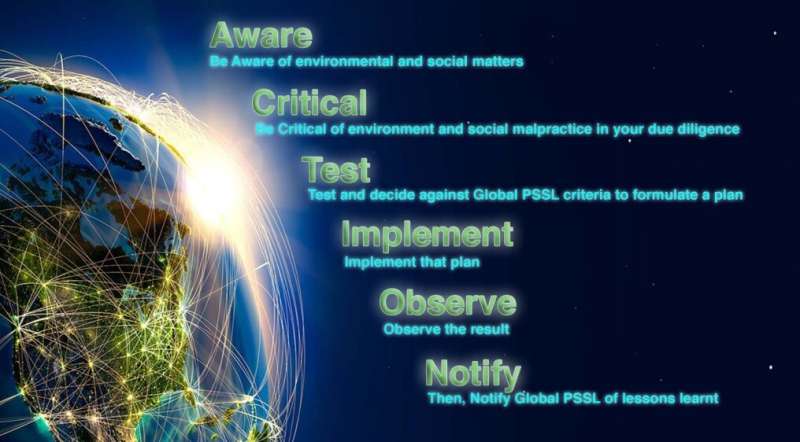New principles to encourage transparency and prevent greenwashing in financial sector
New practical principles will encourage transparency and prevent greenwashing in the financial sector. It is hoped the recommendations will lead to enhanced governance and genuine and lasting improvements in securities finance.
The principles say securities finance initiatives should be transparent in terms of roles and
responsibilities relating to liquidity.
Organizations should demonstrate the genuine and impactful implementation of their ESG/sustainable finance credentials as part of collaborations and partnerships to mitigate any attempts at greenwashing.
These recommendations were developed by Dr. Radek Stech from the University of Exeter Law School. They were subject to several rounds of peer review by senior experts, including UN reviewers, in sustainable finance, securities finance and interrelated fields.
The aim of the principles is to bring about lasting improvements in securities finance and identify common goals, conflicts of interests and ways of working together through collaborations and partnerships.
The principles were developed as part of the research-driven Global Principles for Sustainable Securities Lending (Global PSSL), which has been co-created by Dr. Stech, prominent asset owners, asset managers, sovereign wealth funds, banks, hedge funds other stakeholders committed to positive change since 2018. It benefited from significant funding from the Economic and Social Research Council (ESRC).
It is hoped the principles will encourage partnerships between stakeholders who are willing to be transparent about their public, private and polycentric interests in securities finance.
This enhanced governance should build upon the existing web of interactions and governance and rely on a balanced use of regulation, principles, voluntary guidelines, regulatory supervision, and access to data with technological innovation.
The principles will help companies wishing to enter into transparent collaborations to be more open with regard to their roles and responsibilities. These boundaries are difficult to draw, given that some public goods are provided by private or semi-private entities.
More information:
The principles are available at gpssl.org/wp-content/uploads/2 … -with-regulators.pdf
Citation:
New principles to encourage transparency and prevent greenwashing in financial sector (2023, January 26)
retrieved 26 January 2023
from https://phys.org/news/2023-01-principles-transparency-greenwashing-financial-sector.html
This document is subject to copyright. Apart from any fair dealing for the purpose of private study or research, no
part may be reproduced without the written permission. The content is provided for information purposes only.

New practical principles will encourage transparency and prevent greenwashing in the financial sector. It is hoped the recommendations will lead to enhanced governance and genuine and lasting improvements in securities finance.
The principles say securities finance initiatives should be transparent in terms of roles and
responsibilities relating to liquidity.
Organizations should demonstrate the genuine and impactful implementation of their ESG/sustainable finance credentials as part of collaborations and partnerships to mitigate any attempts at greenwashing.
These recommendations were developed by Dr. Radek Stech from the University of Exeter Law School. They were subject to several rounds of peer review by senior experts, including UN reviewers, in sustainable finance, securities finance and interrelated fields.
The aim of the principles is to bring about lasting improvements in securities finance and identify common goals, conflicts of interests and ways of working together through collaborations and partnerships.
The principles were developed as part of the research-driven Global Principles for Sustainable Securities Lending (Global PSSL), which has been co-created by Dr. Stech, prominent asset owners, asset managers, sovereign wealth funds, banks, hedge funds other stakeholders committed to positive change since 2018. It benefited from significant funding from the Economic and Social Research Council (ESRC).
It is hoped the principles will encourage partnerships between stakeholders who are willing to be transparent about their public, private and polycentric interests in securities finance.
This enhanced governance should build upon the existing web of interactions and governance and rely on a balanced use of regulation, principles, voluntary guidelines, regulatory supervision, and access to data with technological innovation.
The principles will help companies wishing to enter into transparent collaborations to be more open with regard to their roles and responsibilities. These boundaries are difficult to draw, given that some public goods are provided by private or semi-private entities.
More information:
The principles are available at gpssl.org/wp-content/uploads/2 … -with-regulators.pdf
Citation:
New principles to encourage transparency and prevent greenwashing in financial sector (2023, January 26)
retrieved 26 January 2023
from https://phys.org/news/2023-01-principles-transparency-greenwashing-financial-sector.html
This document is subject to copyright. Apart from any fair dealing for the purpose of private study or research, no
part may be reproduced without the written permission. The content is provided for information purposes only.
